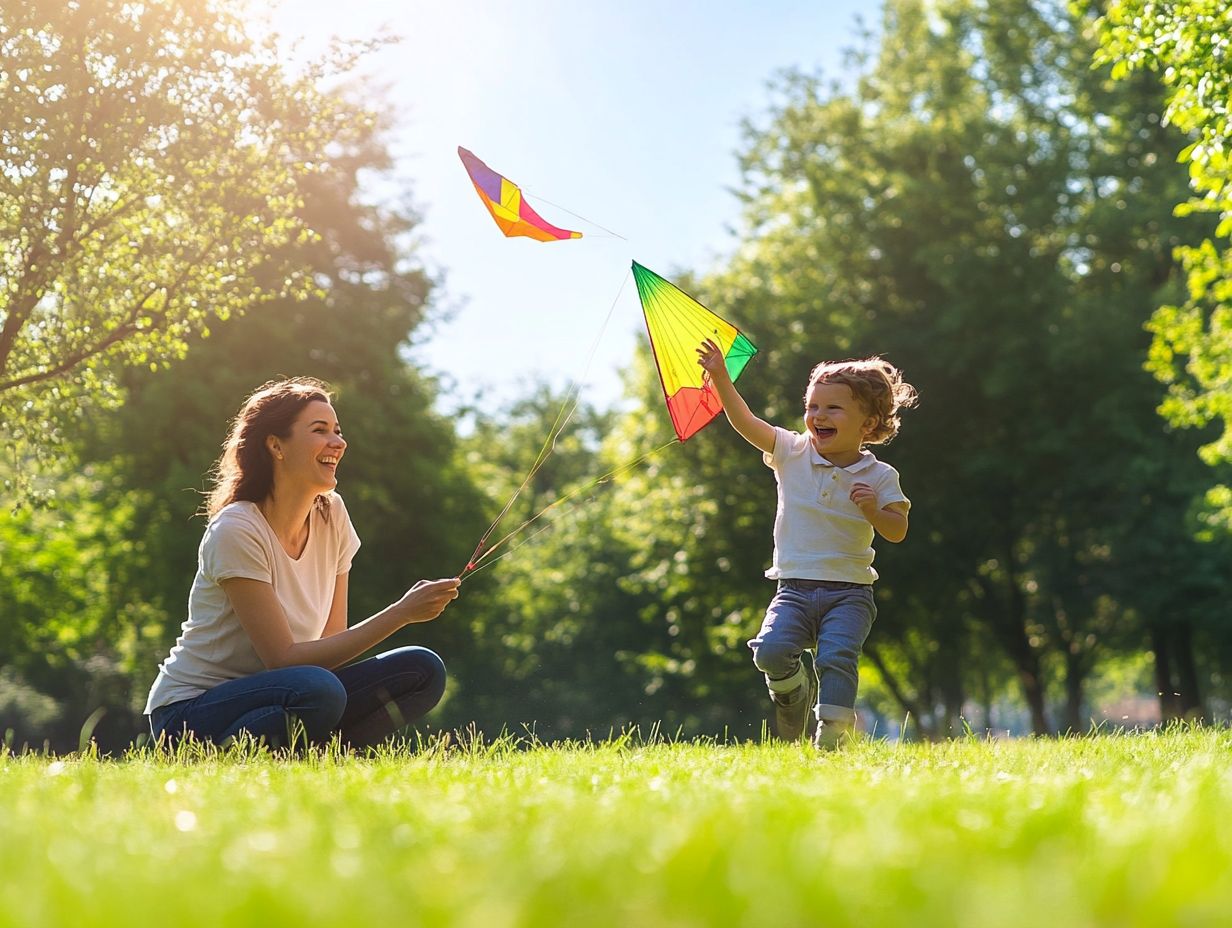The Importance of Playfulness in Parenting
Playfulness transcends mere fun and games; it is a crucial element of effective parenting that nurtures deeper connections and promotes your child’s development. Playful parenting helps create a fun environment where play with children is both meaningful and enjoyable.
This article delves into the importance of playfulness in parenting, showcasing the myriad benefits it brings to both children and parents. Discover how playful moments and playful behaviors can transform your family life.
Uncover practical parenting strategies to seamlessly integrate playfulness into your daily routine, fortify your bond with your child, and approach common parenting challenges with a more lighthearted perspective. Learn how playful communication and playful interactions can enhance your parenting tools.
Join us on this exciting journey to create a joyful and engaging family atmosphere! Engage with kids in playful adventures that boost confidence and foster social skills.
Contents
Key Takeaways:

- Playfulness in parenting helps children develop important skills such as creativity, problem-solving, and social interaction. These playful experiences are vital for child development and emotional growth.
- Engaging in playful activities with your child can strengthen your bond and improve communication, making parenting challenges easier to navigate.
- Creating a playful environment and incorporating humor and imagination into parenting can reduce stress and tension for both children and parents. Playful memories and playful engagement lead to a happy family.
Understanding Playfulness in Parenting
Playfulness in parenting embodies a joyful and engaging approach that transforms the way you interact with your children. By adopting this style, you cultivate a vibrant environment where playful moments seamlessly evolve into meaningful playtime, allowing you and your children to forge a deeper connection and build trust. This playful mindset encourages positive interactions and nurturing skills.
Embracing imaginative play invites you to actively engage with your kids, creating abundant opportunities for laughter and exploration. By encouraging this playful way of thinking, you enhance your children’s social skills, emotional well-being, and cognitive development. This ultimately fortifies family relationships and fosters a harmonious family dynamic. Everyday play and playful learning are essential components of this approach.
Why is Playfulness Important in Parenting?
Embracing playfulness in parenting is essential, as it significantly enhances emotional well-being and cognitive development in children, while also fortifying family relationships. By engaging in playful parenting practices, you create invaluable opportunities for your children to cultivate essential social skills, improve their ability to cooperate with others, and navigate their emotional landscapes.
This approach not only nurtures a positive atmosphere within your family but also equips your children with vital life lessons and meaningful interactions as they grow.
Engaging in playful interactions can serve as a powerful stress reliever for both you and your children, allowing emotional connections to deepen through shared laughter and creativity. When you adopt a playful demeanor, you encourage your young ones to express themselves freely, leading to enhanced communication skills and heightened empathy. These playful relationships foster a positive atmosphere within the family.
Such interactions lay the groundwork for emotional resilience, arming your children with the tools they need to tackle challenges effectively in the future. Therefore, creating a fun and supportive environment isn’t merely about enjoyment; it intricately weaves into the essence of effective parenting, ensuring holistic growth and a stronger familial bond. It’s about nurturing playful communication and emotional well-being.
How Does Playfulness Benefit Children?
Playfulness significantly enriches your child’s development across various domains, including cognitive and emotional growth. When they engage in playful experiences, they acquire essential life skills, boost their confidence, and unleash their creativity through imaginative scenarios. By interacting playfully with you, they can cultivate critical social skills that foster connections and cooperation with their peers, ultimately enhancing their overall well-being. These playful moments are integral to child development.
Consider activities like building with blocks; these not only stimulate cognitive skills such as problem-solving and spatial awareness but also promote cooperation and communication as children work together on their constructions. Role-play games serve to enhance empathy, allowing children to appreciate different perspectives while acting out various characters in their imaginative journeys. These learning activities are excellent examples of cooperative play.
When they dive into physical play, such as tag or jumping rope, they experience joy and excitement, which play a vital role in their emotional health. Playdates and playful adventures contribute significantly to this joy of play.
These playful encounters provide a safe environment for children to face challenges, nurturing their confidence and resilience as they navigate the ups and downs of everyday life. These playful memories are essential for building trust and deeper connections.
How Can Parents Incorporate Playfulness into Parenting?
You can seamlessly weave playfulness into your parenting by embracing a variety of strategies that encourage engagement and interaction with your children. Consider crafting a lively environment where playful learning thrives, highlighting the significance of being fully present and actively involved in activities that promote shared play. These playful parenting strategies help create a positive atmosphere and joyful experiences.
By infusing humor and creativity into your daily routines, you not only amplify the joy of play but also cultivate cherished moments that strengthen family bonds and foster positive interactions. These playful behaviors are essential for a happy family.
1. Be Present and Engage with Your Child
Being present and actively engaging with your child is crucial to embracing playful parenting, as it nurtures deeper connections and enriches playtime. By dedicating quality moments to interact with your child, you create an atmosphere of trust and cooperation that allows them to explore imaginative scenarios, stimulating their cognitive development. This practice not only enhances your relationship with your child but also encourages them to express their feelings and thoughts freely. Such playful engagement is fundamental for meaningful playtime.
When you are fully attentive during these precious moments, you become attuned to the non-verbal cues and emotions that might otherwise slip by unnoticed, further strengthening that bond. Techniques such as setting aside distractions, actively participating instead of merely supervising, and employing open-ended questions can help you maintain focus and connection. This approach is crucial for fostering connection and cooperation.
Engaging in activities like building blocks together, collaborative art projects, or simple role-playing games can significantly boost your child’s teamwork and communication skills. These shared experiences not only foster cooperation but also instill a sense of security in your child, reassuring them that their thoughts and participation are genuinely valued. Such playful engagement is key to establishing playful relationships.
2. Use Humor and Creativity

Incorporating humor and creativity into your parenting can elevate playful interactions. This transforms playtime into a delightful and memorable experience for both you and your children.
By introducing playful antics, silly voices, or imaginative storytelling, you can ignite laughter and joy during everyday activities. This creates a positive atmosphere that encourages your little ones to explore and imagine.
These playful activities are essential for joyful experiences and learning.
This playful approach strengthens family relationships and nurtures your children’s emotional well-being and thinking skills. Engaging in shared play and playful behaviors enhances the joy of play for the entire family.
Engaging in activities like improvisational games, where you and your kids invent characters and scenarios together, can lead to hilarious outcomes that spark creativity. Take, for example, a simple game of ‘crazy charades’, where family members act out wild animals or covert agents, resulting in belly laughs and precious bonding moments.
These playful adventures create cherished moments and lasting memories.
You can also weave humor into arts and crafts by inviting your children to create whimsical art pieces or compose silly songs. These joyful experiences uplift spirits and foster an environment where both you and your children feel free to express yourselves.
As laughter fills your home, it strengthens the family bond, enhances emotional resilience, and creates lasting memories that everyone will cherish.
Playful relationships and memories become the cornerstone of your family’s joy and levity.
3. Encourage Imagination and Exploration
Encouraging imagination and exploration is at the heart of playful parenting. It allows your child to engage in creative play that fuels cognitive development and emotional growth.
You can facilitate this journey by providing a variety of resources think toys, books, and other materials that spark imaginative scenarios and inspire your child to explore their interests. This playful approach enriches their learning experiences and imparts valuable life lessons through cooperative play and joyful engagement.
By crafting an environment filled with open-ended activities, you empower your child to dive into their creativity.
Everyday items, like cardboard boxes, can become magnificent castles or challenging obstacle courses, promoting physical play while stimulating their problem-solving skills.
These playful experiences are critical for cognitive skills development.
Nature walks offer another incredible opportunity, where the wonders of the outdoors ignite storytelling and exploration. Incorporating art supplies for crafting or storytelling sessions can further enhance this creative adventure.
Such playful adventures are ideal for nurturing skills and promoting emotional well-being.
These fun activities not only bring you and your child closer but also build a strong foundation for their confidence, resilience, and social skills!
These playful adventures contribute significantly to a child’s emotional and cognitive development. Jump into these playful adventures today! They are crucial for your child’s growth.
4. Create a Playful Environment
Creating a playful environment is crucial for cultivating a fun atmosphere that encourages joyful experiences and nurtures positive interactions within your family. This environment promotes playful engagement and nurturing skills.
You can achieve this by thoughtfully organizing play spaces that are easily accessible and brimming with a diverse array of toys, ranging from classic building blocks to modern educational games. Integrating interactive activities, such as group crafts or outdoor games, promotes collaboration and teamwork, transforming playtime into a shared adventure rather than a solitary activity. Incorporate playful learning and imaginative play to further boost cognitive development and social skills.
A positive atmosphere, filled with laughter and creativity, can profoundly influence your family relationships, offering invaluable opportunities for parents and children to bond over shared experiences in a fun environment. To enhance this environment, consider these practical tips for playful engagement:
- Rotate toys to keep interest alive and stimulate cognitive skills.
- Dedicating time daily for play.
- Actively engage in play to model enthusiasm and involvement.
What Are the Effects of Playfulness on Parent-Child Relationships?
The impact of playfulness on parent-child relationships is truly remarkable, as it cultivates connection and cooperation while promoting emotional growth and emotional well-being.
By embracing playful parenting practices, you encourage positive interactions that fortify family bonds, allowing both you and your child to build trust and understanding, resulting in a deeper connection.
This delightful dynamic not only nurtures your child’s emotional well-being but also weaves together lasting playful memories that foster a supportive family environment.
1. Builds Stronger Bond
Playfulness in parenting is essential for forging a stronger bond between you and your child, cultivating an emotional connection that enhances overall emotional well-being. By engaging in meaningful playtime and nurturing activities, you can foster a sense of security and trust, allowing your child to feel truly valued and understood. This bond promotes emotional growth and lays a solid foundation for healthy relationships as your child develops.
Through imaginative play, outdoor games, or even simple arts and crafts, you can create an environment where your child feels comfortable expressing themselves. These playful interactions go beyond mere entertainment; they present vital opportunities for you to listen and respond to your child’s needs, reinforcing the message that they are loved and supported while also aiding in their child development.
Over time, this sense of emotional security gives your child the power to approach friendships with confidence and empathy, equipping them with the social skills necessary to navigate their social landscapes effectively. The ability to engage in cooperative play with peers often stems from experiences shared with you, ultimately fostering lasting, meaningful relationships as they grow.
2. Improves Communication and Understanding
Playful parenting greatly enhances communication and understanding between you and your child, cultivating a nurturing environment where feelings can be expressed with ease. Through lighthearted interactions, you gain deeper insight into your child’s thoughts and emotions, promoting their emotional growth and resilience. This playful dynamic encourages your child to share their experiences openly, strengthening family bonds and fostering mutual understanding in a positive atmosphere.
By engaging in playful activities, you create a safe haven that inspires your child to express themselves without the fear of judgment. These playful behaviors help create a joy of play. Techniques like role-playing, games, or storytelling transform discussions into enjoyable experiences rather than daunting tasks, aiding in emotional growth and fostering playful relationships.
These methods not only grant you valuable insights into your child’s world, but they also empower them to articulate their feelings more effectively. As a result, this playful approach to communication nurtures emotional intelligence, equipping your child with the essential tools to navigate their emotions and relationships throughout their lives while also building trust.
3. Reduces Stress and Tension

Engaging in playful parenting practices, which include interactive and fun activities with your kids, can be a delightful way to reduce stress and tension within your family, creating a positive atmosphere that supports emotional health and creates playful moments.
By prioritizing fun interactions and shared play, you can create an environment where challenges are met with laughter and lightheartedness. This playful approach alleviates stress for both you and your children, significantly enhancing the overall family dynamic and promoting joy and levity.
Incorporating humor into your daily routines be it telling silly jokes at dinner or spontaneously breaking into a dance party in the living room transforms mundane tasks into moments of joy, all while strengthening family bonds. Activities like board games or outdoor sports encourage teamwork and communication, allowing everyone to connect in a relaxed setting, fostering positive interactions.
These playful moments serve as a refreshing break from daily pressures, enhancing resilience and fostering a more optimistic outlook among family members. Ultimately, this commitment to joyful interactions cultivates an atmosphere where emotional well-being flourishes, ensuring that everyone feels supported and understood, even in the midst of life s challenges, promoting a happy family.
How Can Playfulness Help with Parenting Challenges?
Harnessing playfulness can be an invaluable asset in your parenting toolkit, equipping you with effective strategies for discipline and emotional regulation. By embracing a playful mindset, you can tackle behavioral challenges with humor and creativity, turning potential conflicts into opportunities to impart essential life lessons.
This approach not only alleviates stress and helps you navigate emotional hurdles but also cultivates a supportive and resilient family environment that thrives on joy and connection. It aids in nurturing skills and promotes playful behaviors.
1. Discipline and Behavior Management
Employing playful parenting techniques can truly revolutionize your approach to discipline and behavior management, making the process not only more effective but also enjoyable for both you and your child. By weaving humor and creativity into your disciplinary actions, you can skillfully redirect negative behaviors while nurturing emotional growth and understanding.
This approach reinforces positive interactions and creates a supportive environment where your child can learn from their mistakes.
For example, instead of opting for the traditional time-out, you might introduce a silly time-out where your child has to make funny faces in front of a mirror. This transforms a potentially negative experience into an opportunity for laughter and fun!
Similarly, when your child is reluctant to share their toys, consider launching a playful negotiation game. They can earn back their toys by completing simple tasks or sharing with their favorite stuffed animal first.
Such techniques not only cultivate empathy but also empower your child to develop essential self-regulation skills, enabling them to manage their emotions and behaviors more effectively across various situations.
Try incorporating these playful parenting techniques into your routine and watch how they transform your family dynamics!
2. Dealing with Sibling Rivalry
Playful parenting serves as a powerful strategy for tackling sibling rivalry. It fosters cooperative play and nurtures positive interactions among your children. By encouraging shared play experiences and cultivating a lighthearted atmosphere, you can guide your siblings to learn cooperation and support one another.
This playful approach not only enhances emotional well-being but also equips your children with essential conflict resolution skills while strengthening their bonds.
Engaging in activities like cooperative games allows you to create opportunities for your children to work together toward a common goal. This effectively reduces competition and nurtures teamwork.
Incorporating emotionally supportive play, such as role-playing or storytelling, can further assist your children in navigating their feelings about one another. By modeling empathy and validating each child’s emotions during these interactions, you can facilitate meaningful discussions that lead to mutual understanding.
Establishing routines that include regular family game nights reinforces positive dynamics. This gives your children the chance to celebrate shared successes and learn from their challenges in a safe and nurturing environment.
3. Coping with Stress and Burnout
Incorporating playfulness into your parenting approach can be a game changer when it comes to managing stress and burnout. It helps create a more balanced and emotionally healthy family dynamic. Engaging in playful activities allows you to alleviate the pressures of daily life, fostering joyful moments that recharge your emotional well-being and ensure a happy family.
Playing helps you and shows your children how to handle stress in healthy ways. Taking time to play whether through family game nights, outdoor adventures, or creative arts and crafts lets you reconnect with your inner child while strengthening the bonds with your little ones.
Picture impromptu dance parties in the living room, nature walks where everyone hunts for interesting leaves, or crafting silly stories together that spark laughter and deep conversations, creating playful memories.
These moments are a fun break that energizes the family! They promote a nurturing environment where everyone feels supported and valued, and where playful interactions flourish. By prioritizing play as a form of self-care, which means taking time for yourself physically and emotionally, you can transform stress into moments of joy, ultimately fostering resilience within your family unit.
Frequently Asked Questions
What is the importance of playfulness in parenting?

Experts like Dr. Lynn Barnett and Shauna Tominey emphasize the significance of playfulness in parenting. Playfulness is an essential aspect of parenting as it helps to strengthen the bond between a parent and child, fostering a deeper connection and family relationship.
It also promotes emotional well-being and social skills development in children, improves their communication skills, and enhances their creativity and problem-solving abilities.
How does playfulness benefit children?
According to Lawrence Cohen, playfulness can significantly benefit children’s emotional growth and cognitive skills. It allows children to explore their imagination and learn about the world around them in a fun and engaging way.
This joyful engagement facilitates cognitive development and helps them to develop essential skills such as cooperation, empathy, and self-expression, which are crucial for their overall development.
What are some ways to incorporate playfulness into parenting?
There are various ways to incorporate playfulness into parenting, such as joining in on your child’s play, creating silly games, using humor, and encouraging imaginative play. You can also introduce new activities, like playdates or sports, and toys that promote creativity and exploration.
These playful moments can lead to meaningful playtime and shared play experiences.
Can Playfulness Help in Disciplining Children?
Research from Frontiers in Psychology suggests that playful parenting can be effective in various disciplinary contexts.
Playfulness can be an effective tool for disciplining children. By using fun techniques, such as turning chores into games or using a silly voice to give instructions, parents can make the disciplinary process more enjoyable and less intimidating. Fun parenting techniques can boost confidence and teach valuable life lessons in a positive way.
What Are Some Benefits of Playfulness for Parents?
Studies from institutions like Oregon State University highlight the emotional well-being benefits of playful experiences for parents.
Playfulness benefits not only children but also parents. It reduces stress levels, improves communication, and creates a joyful atmosphere at home. Engaging in playful behaviors allows parents to relax, connect with their inner child, and foster a positive environment. Embracing play can transform your family’s happiness!
Is There a Balance Between Being Playful and Being Authoritative as a Parent?
UNICEF emphasizes the importance of balancing playful interactions with authoritative parenting, which involves setting clear rules and expectations.
Yes, parents should balance being playful and authoritative. While playfulness helps build strong relationships, being authoritative is necessary for setting boundaries and teaching important values and behaviors. Finding a healthy balance is crucial for effective parenting. Tools like playful communication and engagement can help achieve this balance and build trust.
Conclusion
Incorporating playfulness into your parenting approach can create a happier family dynamic. By using fun techniques, recognizing the benefits for both children and parents, and maintaining a balance between play and authority, you can foster a positive and nurturing environment for your children.






